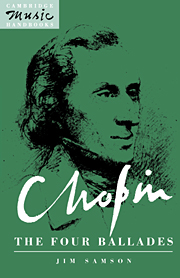4 - Genre
Published online by Cambridge University Press: 03 December 2009
Summary
Theories
‘In Scherzi, Ballades, Polonoises (sic), Preludes etc. the individual character of each rarely fails to be admirably maintained.’ This was the view of the critic of The Athenaeum in his obituary of Chopin (27 October 1849). His remark returns us to the concept of genre, which must now be addressed more fully. Before considering the Chopin ballade as a genre it may be helpful to prepare the ground by looking briefly at theoretical perspectives on genre. Theories of genre – addressing definition, function and causes – have a lengthy, even an ancient, pedigree in literary studies and they have found a place in musicology too. In the widest understanding of the term a genre is defined not only by formal and stylistic properties, but also by social context. And in this sense we might regard the lyric piano piece of the early nineteenth century as an undivided genre, its evolution and characteristic profile heavily dependent on a particular validating community, and its multiple titles carrying a collective connotation. Within the terms of this broad definition Chopin might well be regarded as one of the most persuasive advocates of an emergent genre, and his titles are entirely characteristic. However, we learn little from this perspective about the status of the ballade.
A narrower understanding of genre would locate both primary causes and classifications in the inherent materials of an art, without reference to social context.
- Type
- Chapter
- Information
- Chopin: The Four Ballades , pp. 69 - 87Publisher: Cambridge University PressPrint publication year: 1992



